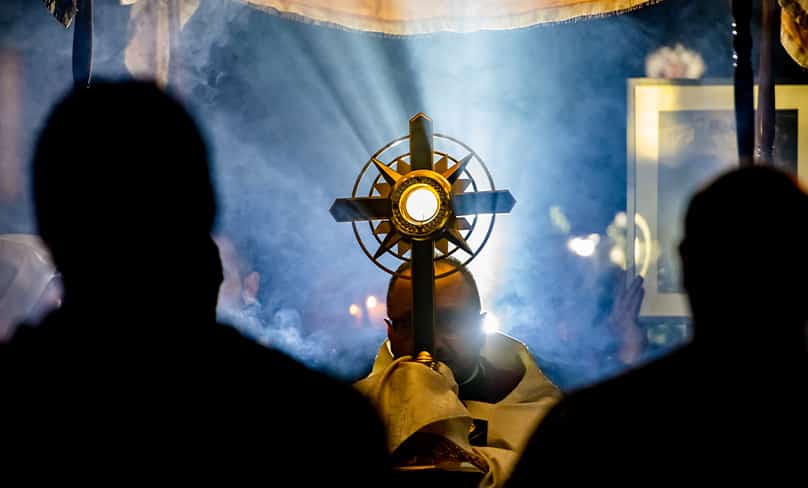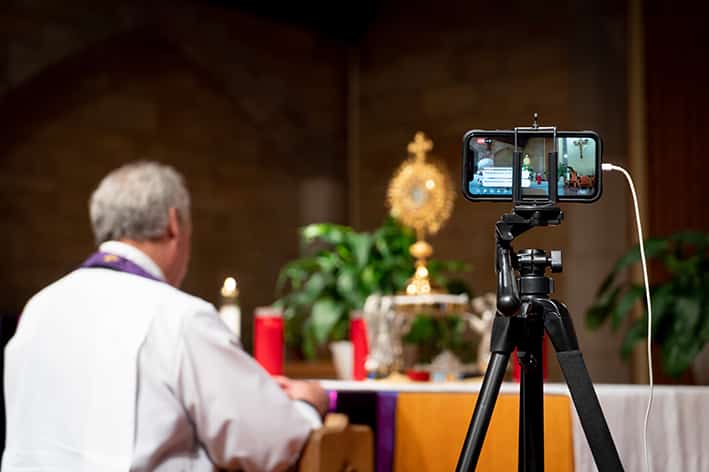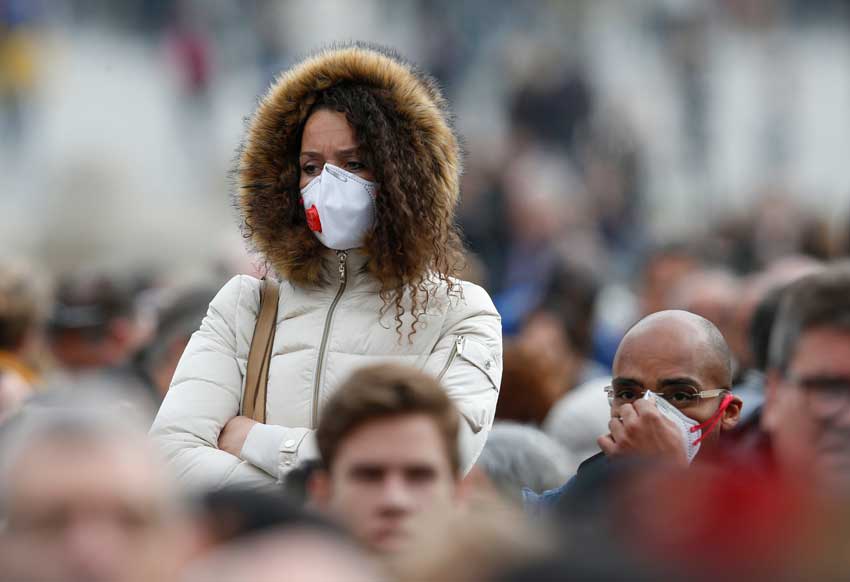
The first Sunday we went back to Mass was the feast of Corpus Christi. I was delighted to realise we could mark this feast, one of my absolute favorites, by receiving the actual corpus Christi inside the church building at last, back where we belong.
I have never been angry or bitter at our bishop for keeping Mass closed to the public. If we’re Catholics, we can’t just go get what we want and ignore the risk to the vulnerable. Even if it’s the body of Christ we want. Especially if it’s the body of Christ we want.
But oh, it was good to be back, even with masks, in alternate pews, with the sweet smells of early June roses and candle wax blending strangely with the increasingly familiar scent of hand sanitiser. I was so glad our separation was over, so glad we could be moving forward and starting to figure out how to safely make life more normal again.
Then came the first reading, and it hit me right between the eyes. It’s a short reading, and very pointed. Moses exhorts the people to remember how God brought them out of Egypt, and how God dealt with them in the desert.
It’s a reading chosen for Corpus Christi because it reminds us: Look, from the very beginning, God has been leading you and feeding you. God doesn’t mind his business up in heaven, but he comes to us in the desert and gives us manna, and then he brings us home. Perfect for the feast day.

But it hit me so hard because of how it’s framed. It doesn’t just tell the story of how God cared for the people. It’s also the story of why God treated them as He did, and it’s a command to think about it and remember it, learn from it. It explicitly says:
“Remember how for forty years now the LORD, your God,
has directed all your journeying in the desert,
so as to test you by affliction
and find out whether or not it was your intention
to keep his commandments.
He therefore let you be afflicted with hunger,
and then fed you with manna,
a food unknown to you and your fathers,
in order to show you that not by bread alone does one live,
but by every word that comes forth from the mouth of the LORD.”
Don’t forget how the Lord cared for you. Don’t forget how he didn’t forsake you. But also, don’t forget how you behaved when he first liberated you. Don’t just remember that God saved you; remember that he wanted you to learn something before he saved you. Remember that you were being kind of crappy, and that’s why he had to handle you this way.
This is why we keep reading scripture: Because it’s not just about history, it’s about us, specifically, literally. In the Passover seder, we don’t just recount the story of what happened to our ancestors. We express it this way: This is what the Lord God did for me when I came out of Egypt.
Here’s what I’m thinking about, as I emerge from the little desert of the lockdown:
I found livestreamed Mass to be perfectly engaging, and in some ways less distracting than actually attending Mass, since it was only my family in the room. But when I realised that I couldn’t return to adoration even after it opened, since it’s a small, enclosed space and masks aren’t mandatory, that made me cry.

I suddenly felt what so many people had lamented feeling when Mass was closed to the public: That something precious was being taken away from me for no good reason. Intellectually I understand why it’s being handled in the way that it is, but I have more sympathy for the sorrow (if not the arguments) of people who missed Mass and were skeptical about the need to close it.
So I’m trying to be more tenderhearted to people who are genuinely suffering with some form of privation or other, even if it feels to me like they’re being unreasonable. Suffering is suffering, whether it makes intellectual sense to feel it or not.
I also learned (again) that there is a part of me that has a thirst for more darkness. I don’t like to admit it, but when you spend a lot of time persuading people, for their own safety, that catastrophe is imminent, it’s very hard to climb back down from a ledge where catastrophe actually feels desirable.
Part of me really wants it to be the end of the world, so the people who thought I was being overcautious would be proved wrong. Just a little part, but still! This is what happens when you focus more on arguing than you do on the human person, and when you put more stock in being right than you do in seeking truth. Mea culpa.
Part of the stress of being stuck in our homes was the inability to get away from people who were driving us crazy. I didn’t feel this too strongly, because I’m not very sociable and I enjoy the company of my family. But for some people, it was a real trial — especially for people who were stuck with an abuser, and couldn’t get out. So now I’m asking myself, “Now that I can come and go as I please, what are the situations where I’m not really stuck, but just acting like I am?”

If I’m on Twitter, for instance, and people are driving me crazy or being abusive, why am I staying there? I can leave. I can get away from these conversations. I’m behaving as if I’m quarantined with difficult people, but actually I can mute them, or refuse to engage, or set my phone down and go outside, and it will be better for all of us. Sometimes we are more free than we like to admit.
I learned (once again) that I jump to the worst conclusions about people based on exterior things. When we knew far less about how COVID-19 is transmitted, I was fully in the grip of terror about going shopping for food, picking up a virus, and bringing it home to my medically fragile child. In my terror, when I saw some people without masks on, I assumed they were just rotten, terrible, selfish louts, and I felt justified in striking out in anger against them.
Now, having had many difficult conversations with sensible people, I’m more likely to remind myself, “Maybe she has asthma. Maybe he has an extreme anxiety disorder, or a history of abuse, and masks are a trigger. Maybe she wore the mask for seven hours at work and just needs a little break. Maybe he’s surrounded by people who are erroneously telling him a mask is dangerous, and he honestly thinks refusing to mask is the right thing to do.”
Whatever their reason is, even if it’s stupid, there’s not a lot I can do about it, and being angry doesn’t make me any safer. So when I see someone without a mask, I deliberately focus my energies on maintaining more distance from him, and then I move along.
And there’s more, but I’ll save it for my confessor. I don’t know what God concluded, after he tested “whether or not it was my intention to keep his commandments”. I do know what the greatest commandment is: To love my neighbour as myself.
Just about every word that comes forth from the mouth of the Lord is about loving my neighbour. It’s good and fitting to be joyful at receiving Christ again, but I can’t ignore this pointed exhortation to stop and reflect, to examine my past behaviour, to compare it to what the Lord has commanded, and to move forward thinking about why God found necessary to put us in the desert in the first place.
So, there’s my soul on display. How about yours? What did the Lord teach you when you were in the desert?
Related articles:
Sydney Catholics celebrate Corpus Christi during COVID
Catholic protest sees unfair rules scrapped
No regrets for bishop after COVID
